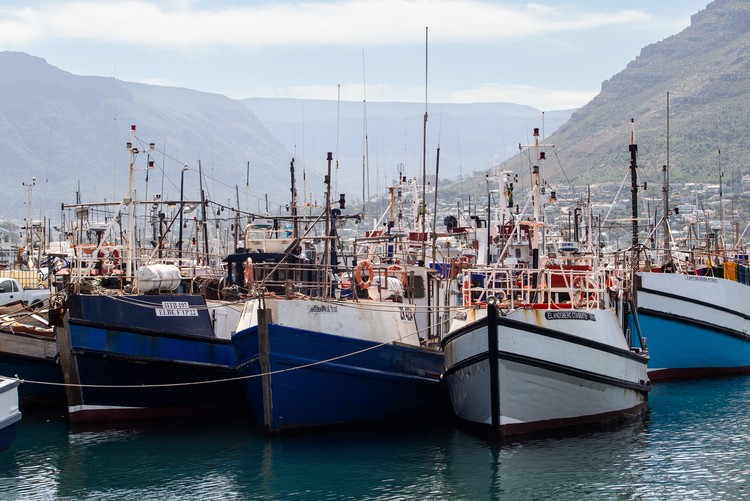Fishing companies take Creecy to court over quotas
Fishing Rights Allocation Process was “rushed and haphazardly allocated” says lawyer for fishers
At least 12 fishing companies are taking the Department of Forestry, Fisheries and the Environment (DFFE) minister to court over the commercial fishing rights allocation process. Archive photo: Ashraf Hendricks
- Fishing companies are challenging the Minister of Environment, Forestry and Fisheries in court over the commercial fishing rights allocation process.
- The companies argue that the rights allocation process was flawed, that the minister scored them incorrectly, and that the appeals process took far too long.
- But the department believes that the appeals process was “fair, equitable and transparent” and plans to defend it.
About 12 companies are taking Minister of Forestry, Fisheries and the Environment Barbara Creecy to court following the conclusion of the commercial fishing rights appeals process at the end of 2023.
The companies are, in separate matters, opposing the refusal of 15-year commercial fishing rights, saying that the decisions were unlawful, and that their applications were scored incorrectly.
The Fishing Rights Allocation Process (FRAP) 2021 was concluded on 28 February 2022. The department received a total of 2,473 applications. The companies were among 1,213 appeals received but were not successful.
The appeals ended in December 2023 and a subsequent total of 845 rights were granted.
Fishers have long been dissatisfied with the outcome of the fishing rights process. In July 2022, GroundUp reported on the appeals process and that some fishers had been calling for the process to be scrapped.
Lawyers Dewald Smit and Shaheen Moolla are representing about ten of the applicants in separate cases against the minister. Applicants are challenging the minister’s refusal of their rights in various sectors such as tuna and hake long-line. Many of them are previous rights holders.
In one application by Greenfish Traders, a seafood company that exports to Europe and the US, said the minister failed to properly address its appeal and also scored the company incorrectly.
Paper Quota Holders are quota holders who rent out their quotas to fishing companies.
Greenfish’s court papers raise concerns about Paper Quota Holders with no vessels, factories, or tuna pole fishing knowledge who were successful but are now selling their permits to businesses like Greenfish, who are “actually able to fish, process, and market tuna”.
In another application, Mossel Bay Indigenous Fishermen, who applied for hake long-line, said that it took the minister 16 months to decide its appeals.
The company stated that it was “forced to subsist and barely exist for some two years while the minister and her department made these unlawful decisions to refuse the … fishing right”.
The company argues that despite their fishing rights being terminated in December 2020, “due to departmental incompetence and simple bad planning, no fishing rights allocation process had been planned to ensure an uninterrupted continuation of commercial fishing”.
Prairie Pride Trading, who had an unsuccessful application for hake long-line, said that every single appeal decision for hake long-line all had the same date. The company’s court application read that it was “not humanly possible” for the minister to read, apply her mind, and decide on 280 hake long-line appeals in a single day.
Moolla told GroundUp that the FRAP process was “rushed and haphazardly allocated” and that there were also extensive flaws in the online process.
Peter Mbelengwa, department spokesperson, said that “the FRAP Appeal process was fair, equitable and transparent and resulted in the correct outcome”.
The department and minister “have received positive feedback on the outcome of the appeal process”. He said the 12 court cases represent a mere 0.48% of the total number of applications.
Mbelengwa said the department intends to defend the decisions taken during the appeals process. He added that the department was unable to respond to some of our questions as they are about an “ongoing legal process”.
Several of the matters will be heard in the Western Cape High Court in May.
Next: Rubbish piles up in growing Mfuleni settlements
Previous: Minister promises to restore water supply to Durban suburbs by 15 February
© 2024 GroundUp. This article is licensed under a Creative Commons Attribution-NoDerivatives 4.0 International License.
You may republish this article, so long as you credit the authors and GroundUp, and do not change the text. Please include a link back to the original article.
We put an invisible pixel in the article so that we can count traffic to republishers. All analytics tools are solely on our servers. We do not give our logs to any third party. Logs are deleted after two weeks. We do not use any IP address identifying information except to count regional traffic. We are solely interested in counting hits, not tracking users. If you republish, please do not delete the invisible pixel.



